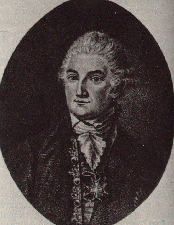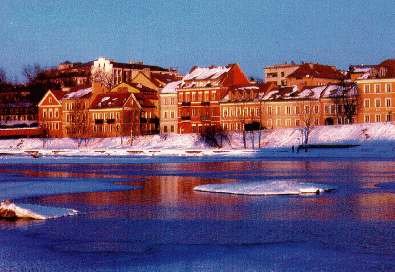Minsk History:
The Decline and Partitions
During the debilitating Northern Wars(1700 - 1721) between the Commonwealth, Sweden,
and Russia, Minsk was twice occupied by the armies of Peter the Great and once by Charles
XII. During his first visitation in 1704, Peter dined twice very civilly with the Jesuits
and inspected his troops in the Upper Market; characteritically, however, during his
second stay in 1708, his Cossacks and Kalmuks pludered the city, sparing neither Catholic
nor Orthodox churches, and set it on fire.
Stanislau Paniatouski, the last king of the Commonwealth
 With the return of peace there was an improvement of
communications. Roads and canals were built; postal services were set up in Belarus in
1717 between Vilnia, Minsk and Mahiliou, and between Minsk and Navagrudak. The Dominicans
established a school in 1727, and in 1792 Pan Szyszka founded a church of St. Roch.
More guilds were formed by Royal privelege for the protection of local trade -- the
Vintners, the Gardeners, the Water-carriers, the Brewers and Meadmakers. Occassionally the
conflicts of jurisdiction between the Municipal Courts, the Grand Ducal Court, the Church
Courts, and the Seignorial Court lit in matters of breach of trade monopolies and unfair
competition. Against a background of dynastic squabbles between the increasingly polonized
Bykouskis, Zaviszas, and Valadakoviczy, rivalries between the various religious
orders(including a famous street-fight in 1728 between the Dominicans and the Jesuits over
some runaway schoolboys), processions, parades, street fairs with dancing bears and
firework displays, the Grand Ducal era of Minsk teetered to its close. The city's great Vajavod
and benefactor Ihnat Zavisza(whose portrait with the sitter wearing aristocratic sash or pojas,
is to be seen in the National Museum of Art), died in 1739, and was laid to rest after a
solemn Requiem at the Maryjnski Cathedral in a blaze of over 4000 candles and 12,000
votive lights.
With the return of peace there was an improvement of
communications. Roads and canals were built; postal services were set up in Belarus in
1717 between Vilnia, Minsk and Mahiliou, and between Minsk and Navagrudak. The Dominicans
established a school in 1727, and in 1792 Pan Szyszka founded a church of St. Roch.
More guilds were formed by Royal privelege for the protection of local trade -- the
Vintners, the Gardeners, the Water-carriers, the Brewers and Meadmakers. Occassionally the
conflicts of jurisdiction between the Municipal Courts, the Grand Ducal Court, the Church
Courts, and the Seignorial Court lit in matters of breach of trade monopolies and unfair
competition. Against a background of dynastic squabbles between the increasingly polonized
Bykouskis, Zaviszas, and Valadakoviczy, rivalries between the various religious
orders(including a famous street-fight in 1728 between the Dominicans and the Jesuits over
some runaway schoolboys), processions, parades, street fairs with dancing bears and
firework displays, the Grand Ducal era of Minsk teetered to its close. The city's great Vajavod
and benefactor Ihnat Zavisza(whose portrait with the sitter wearing aristocratic sash or pojas,
is to be seen in the National Museum of Art), died in 1739, and was laid to rest after a
solemn Requiem at the Maryjnski Cathedral in a blaze of over 4000 candles and 12,000
votive lights.
Trajetski Pradmiescie
 Periodic conflagrations(1737, 1764, 1778), famines, and
outbreaks of the plague led to some reconstruction of Churches and houses in brick rather
than wood and also to the foundation of more hospitals. The great fire in 1737 resulted in
the rebuiding of two Bernardine convents in the Upper Town(including the present Holy
Ghost Cathedral); yet another outbreak in 1764 occassioned rebuilding the Uniate Holy
Trinity convent in Trajecki Pradmiescie. A conflagration finally destroyed the old
timber-frame castle within the earthworks by the Niamiha. An even inreasing number of
houses in city were being out of brick, many of which have survived and in this respect
Minsk was well in advance of Russian cities such as Moscow. By the mid-18th century MInsk
had two benevolent hospitals. As for schools, in addition to fee paying pupils, the Jesuit
college atmitted as students the children of poor families free of charge, until the
suppression of the Order in 1773. Both the Russian and the Dominican monasteries offered
similar free educational facilities, and by 1771 there was also a Mariavitan school for
girls in Trinity suburb.
Periodic conflagrations(1737, 1764, 1778), famines, and
outbreaks of the plague led to some reconstruction of Churches and houses in brick rather
than wood and also to the foundation of more hospitals. The great fire in 1737 resulted in
the rebuiding of two Bernardine convents in the Upper Town(including the present Holy
Ghost Cathedral); yet another outbreak in 1764 occassioned rebuilding the Uniate Holy
Trinity convent in Trajecki Pradmiescie. A conflagration finally destroyed the old
timber-frame castle within the earthworks by the Niamiha. An even inreasing number of
houses in city were being out of brick, many of which have survived and in this respect
Minsk was well in advance of Russian cities such as Moscow. By the mid-18th century MInsk
had two benevolent hospitals. As for schools, in addition to fee paying pupils, the Jesuit
college atmitted as students the children of poor families free of charge, until the
suppression of the Order in 1773. Both the Russian and the Dominican monasteries offered
similar free educational facilities, and by 1771 there was also a Mariavitan school for
girls in Trinity suburb.
Meanwile the election of each new sovereign -- Augustus II (1697 - 1733), Augustus III
(1733 - 1763) and Stanislaw Poniatovski(1764 - 1795) -- and the escalating complaints of
the non-Uniate Greek-rite minority gave a pretext for foreign intervention. In 1733 Minsk
was occupied by more than 20,000 Russian soldiers, cavalry and infantry under General
Volkonsky, accompanied by inevitable swarms of Cossacks and Kalmuks, though it is said
that in the event they were on their best behavior. Inevitably perhaps in these unsettled
times the Grand Duchy was plauged by bandits such Adam Kroher, whose raids sowed panic
throughout Belarus, until his capture and execution in 1737.
Ultimately the Commonwealth was dismembered by Russia, Prussia, and Austria in three
partitions. Polacak, Viviebsk and Mahiliou were annexed by Russia in 1773. A judicial
reorganization of the Grand Ducal Courts followed, resulting in the removal of the Session
of the High Court from Minsk to Harodnia in 1775, but in 1791 the city became the seat of
the Court of Appeal for Vajavodstvy(Counties) of Polacak, Viciebsk and Minsk. Two
years later in 1793 the city and the remaining bulk of the Grand Duchy were occupied by
the Russians. A successful attempt was made by the govenment of the Commonwealth to
persuade the non-Uniate faction in Belarus to leave the Russian jurisdiction for that of
Constantinople. Although the Belarusian Orthodox had agreed to the reform, the Russian
Empress Catherine would not hear of it, and seized on the move as a pretext to intervene
definitively and extend her domains further to the west. By 1796 the whole ethnic
territory of Belarus had been absorbed in the Russian empire, of which it was to remain a
part for almost 120 years.
![[Previous]](../../images/misc/previous.gif)
![[Up]](../../images/misc/up.gif)
![[Next]](../../images/misc/next.gif)
 With the return of peace there was an improvement of
communications. Roads and canals were built; postal services were set up in Belarus in
1717 between Vilnia, Minsk and Mahiliou, and between Minsk and Navagrudak. The Dominicans
established a school in 1727, and in 1792 Pan Szyszka founded a church of St. Roch.
More guilds were formed by Royal privelege for the protection of local trade -- the
Vintners, the Gardeners, the Water-carriers, the Brewers and Meadmakers. Occassionally the
conflicts of jurisdiction between the Municipal Courts, the Grand Ducal Court, the Church
Courts, and the Seignorial Court lit in matters of breach of trade monopolies and unfair
competition. Against a background of dynastic squabbles between the increasingly polonized
Bykouskis, Zaviszas, and Valadakoviczy, rivalries between the various religious
orders(including a famous street-fight in 1728 between the Dominicans and the Jesuits over
some runaway schoolboys), processions, parades, street fairs with dancing bears and
firework displays, the Grand Ducal era of Minsk teetered to its close. The city's great Vajavod
and benefactor Ihnat Zavisza(whose portrait with the sitter wearing aristocratic sash or pojas,
is to be seen in the National Museum of Art), died in 1739, and was laid to rest after a
solemn Requiem at the Maryjnski Cathedral in a blaze of over 4000 candles and 12,000
votive lights.
With the return of peace there was an improvement of
communications. Roads and canals were built; postal services were set up in Belarus in
1717 between Vilnia, Minsk and Mahiliou, and between Minsk and Navagrudak. The Dominicans
established a school in 1727, and in 1792 Pan Szyszka founded a church of St. Roch.
More guilds were formed by Royal privelege for the protection of local trade -- the
Vintners, the Gardeners, the Water-carriers, the Brewers and Meadmakers. Occassionally the
conflicts of jurisdiction between the Municipal Courts, the Grand Ducal Court, the Church
Courts, and the Seignorial Court lit in matters of breach of trade monopolies and unfair
competition. Against a background of dynastic squabbles between the increasingly polonized
Bykouskis, Zaviszas, and Valadakoviczy, rivalries between the various religious
orders(including a famous street-fight in 1728 between the Dominicans and the Jesuits over
some runaway schoolboys), processions, parades, street fairs with dancing bears and
firework displays, the Grand Ducal era of Minsk teetered to its close. The city's great Vajavod
and benefactor Ihnat Zavisza(whose portrait with the sitter wearing aristocratic sash or pojas,
is to be seen in the National Museum of Art), died in 1739, and was laid to rest after a
solemn Requiem at the Maryjnski Cathedral in a blaze of over 4000 candles and 12,000
votive lights.  Periodic conflagrations(1737, 1764, 1778), famines, and
outbreaks of the plague led to some reconstruction of Churches and houses in brick rather
than wood and also to the foundation of more hospitals. The great fire in 1737 resulted in
the rebuiding of two Bernardine convents in the Upper Town(including the present Holy
Ghost Cathedral); yet another outbreak in 1764 occassioned rebuilding the Uniate Holy
Trinity convent in Trajecki Pradmiescie. A conflagration finally destroyed the old
timber-frame castle within the earthworks by the Niamiha. An even inreasing number of
houses in city were being out of brick, many of which have survived and in this respect
Minsk was well in advance of Russian cities such as Moscow. By the mid-18th century MInsk
had two benevolent hospitals. As for schools, in addition to fee paying pupils, the Jesuit
college atmitted as students the children of poor families free of charge, until the
suppression of the Order in 1773. Both the Russian and the Dominican monasteries offered
similar free educational facilities, and by 1771 there was also a Mariavitan school for
girls in Trinity suburb.
Periodic conflagrations(1737, 1764, 1778), famines, and
outbreaks of the plague led to some reconstruction of Churches and houses in brick rather
than wood and also to the foundation of more hospitals. The great fire in 1737 resulted in
the rebuiding of two Bernardine convents in the Upper Town(including the present Holy
Ghost Cathedral); yet another outbreak in 1764 occassioned rebuilding the Uniate Holy
Trinity convent in Trajecki Pradmiescie. A conflagration finally destroyed the old
timber-frame castle within the earthworks by the Niamiha. An even inreasing number of
houses in city were being out of brick, many of which have survived and in this respect
Minsk was well in advance of Russian cities such as Moscow. By the mid-18th century MInsk
had two benevolent hospitals. As for schools, in addition to fee paying pupils, the Jesuit
college atmitted as students the children of poor families free of charge, until the
suppression of the Order in 1773. Both the Russian and the Dominican monasteries offered
similar free educational facilities, and by 1771 there was also a Mariavitan school for
girls in Trinity suburb.